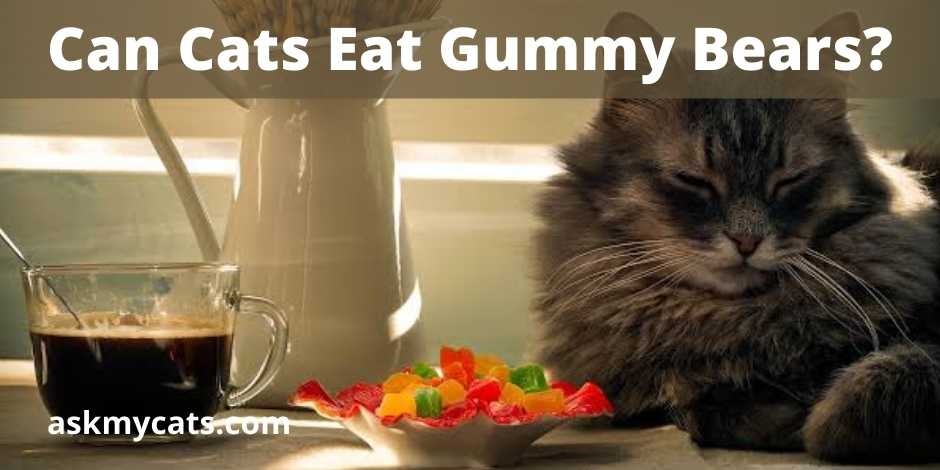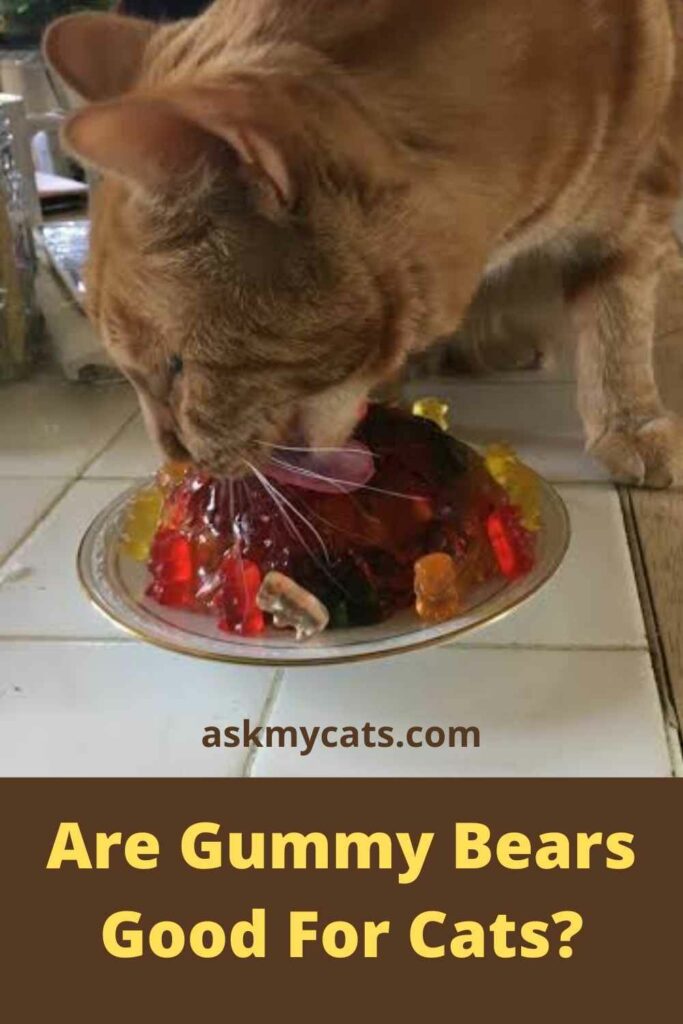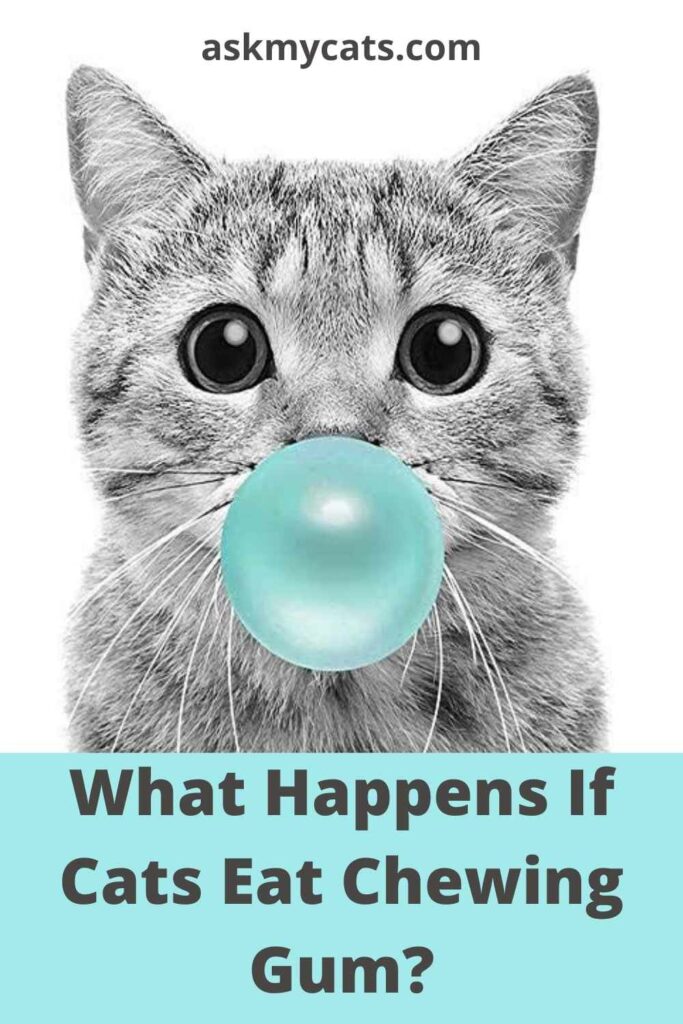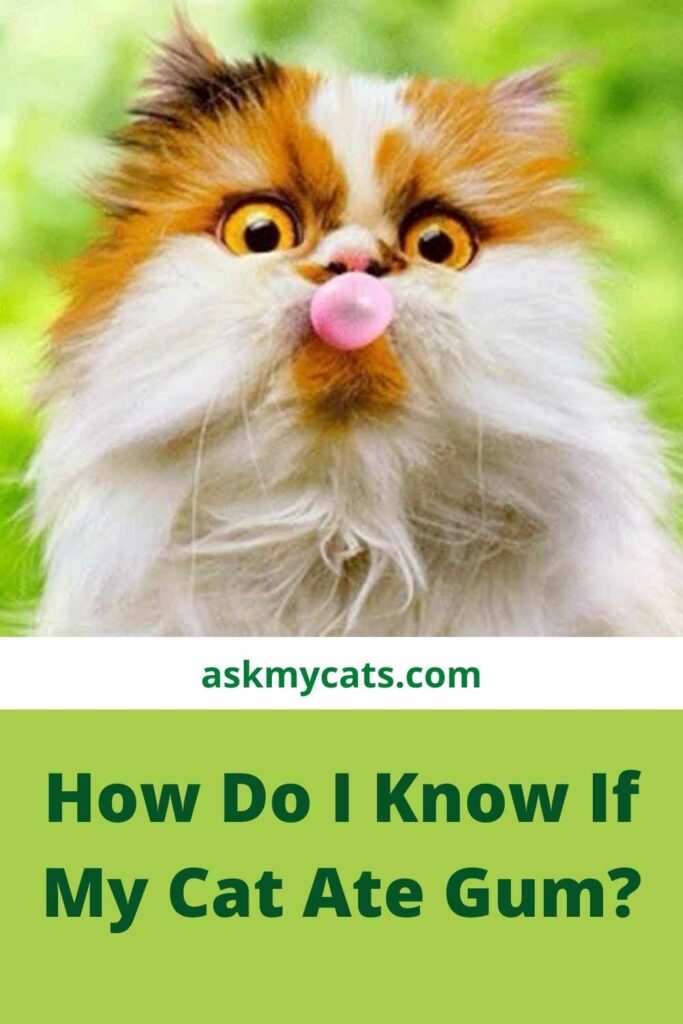Nothing beats a fresh bag of gummy bears after you come home from a long day of work. However, when you open the bag, your cat comes running. She assumes you are opening up a bag of treats to feed her.
You start wondering if you can give her gummy bears as a treat.
Gummy bears should not be eaten by cats. Gummy bears are deficient in the nutrients that cats require. They’re high in sugar and might cause choking hazards in cats who eat them.
Sugary treats are a great snack for humans, but they are not the best option for your cat. If you want to learn more about the kind of treats you should or should not give to your feline friend, keep reading.


Give Your Cat the Perfect Day
Get the Free Ebook!
Are Gummy Bears Good For Cats?
Gummy bears are harmful to cats. While they are neither fatal nor toxic to cats, they are nonetheless unhealthy to consume and should not be included in your cat’s daily diet.
Your cat may not be aware that gummy bears are dangerous to it, but you are, therefore you must make a decision for your feline companion.
The following are some of the reasons why you should not give gummy bears to your cat:

1. They Are Made Of Sugar
Sugar should not be eaten by cats and gummy bears are high in sugar. Some gummy bears are even sugar-coated on the exterior.
This reason alone should be enough for you to stop letting your furry friend from consuming gummy bears,
2. They Are A Choking Hazard
Gummy bears are chewy and gummy, as their name indicates. Most cats aren’t used to eating something with that texture, and if they don’t chew the gummy bear well enough, they may choke.
3. They Lack Nutrients Cats Require
Even if your cat is able to comfortably consume a gummy bear, the gummy bear is nothing more than empty calories in your cat’s diet. Your cat isn’t getting the nutrients she needs to be strong and healthy from the gummy bear.
4. They Might Get Trapped In Your Cat’s Teeth
This happens to humans as well. Because gummy bears are sticky, they may become trapped in your cat’s jaws. Your cat’s tongue isn’t as maneuverable as ours, and she can’t utilize dental floss to keep the gummy bear from being trapped in his teeth.
5. Your Cat May Get A Stomachache
Your cat could develop a stomachache since she isn’t used to eating gummy bears. This might also cause your cat to vomit or have diarrhea, indicating that he or she is not feeling well.
6. Your Cat May Get Accustomed To Gummy Bear As A Reward
If you do offer your cat a gummy bear as a reward, you may have a problem if your cat becomes accustomed to receiving goodies on a regular basis. Your one-time treat might evolve into your cat requesting gummy bears as a treat.
Since your cat isn’t used to eating gummy bears, she may get a stomachache. This could also cause diarrhea or vomiting, which may be a sign that your cat not feeling well.
Can Cats Eat Fruit Gummies?
No, fruit snacks should not be eaten by cats. Fruit gummies are manufactured from fruit juice concentrate and lack fruit fiber which makes them harmful to cats.
Some contain even more sugar than candy, making them particularly harmful to cats. Therefore, avoid giving your cat fruit gummies.
Can Cats Eat Gum?
No, cats should not be allowed to eat gum. The sweetener xylitol, which is harmful to dogs and cats, is included in several chewing gums.
Cats’ sugar-regulating mechanism isn’t sure what to make of xylitol. Because the body interprets this as a spike in sugar, it produces more insulin than usual.
Insulin lowers blood sugar levels, however, it doesn’t work with xylitol. As a result, there is a potentially hazardous dip in blood sugar. This is called hypoglycemia.
Hypoglycemia can cause weakness, lethargy, collapse, and even seizures. The therapies must be begun very once, and IV medication must be included to boost blood sugar levels and attempts to halt the bleeding.
Therefore, try to keep gums away from your furry friend.
Also, check out is vaseline safe for cats wounds
What Happens If Cats Eat Chewing Gum?
Chewing gum is detrimental to your cat’s health. There are a number of problems that could arise if your cat ate chewing gum:

1. Choking
Choking is one of the first things that can happen if your cat consumes a piece of gum. When gum becomes wet, it becomes sticky and chewy.
The gum might become stuck in your cat’s throat if she eats it. As she attempts to pull it out, she may start heaving and panicking.
If you can see it in her mouth, carefully restrain the cat and get it out; if not, bring her to an emergency room as soon as possible. You don’t want to reach down her throat and grasp anything you can’t see since you could end up pushing it farther deeper.
2. Intestinal Obstruction
We spit out chewing gum because it isn’t digestible. However, your feline is completely unaware of this. If a piece of chewing gum is swallowed by your cat, it may become trapped in her small digestive tract.
Keep an eye out for vomiting, loss of weight, and dehydration. She may not be able to pass stool for many days, leaving just pee in her litter box.
Your veterinarian may need to conduct emergency surgery to remove the blockage, depending on its severity and location.
3. Blood Sugar Problems
In place of sugar, xylitol is commonly used as a sweetener in sugar-free chewing gums. While xylitol is totally harmless for humans, it can be deadly for your four-legged companion.
In cats, xylitol affects the hormone insulin, which regulates blood sugar levels. When xylitol is absorbed by a cat’s digestive system, her pancreas releases additional insulin into her bloodstream.
As a result, her blood sugar levels will drop dangerously low, resulting in hypoglycemia.
Your pet friend will start to show indications of hypoglycemia within 30 to 60 minutes of chewing xylitol gum. The cat may feel drowsy, have trouble walking, or experience a seizure. Hypoglycemia, if left untreated, can lead to liver failure in a matter of days.
4. Other Problems
Cats are naturally interested in their surroundings. To discover what it is, they will put just about anything in their mouths. The hazard of chewing gum isn’t the only one.
You may see your cat chewing on cables, tasting houseplants, or even savoring her litter. Because younger cats are more prone to chomping on everything, they are more likely to develop intestinal blockages.
Xylitol is included in a variety of sugar-free ice creams, pastries, and sweets, in addition to chewing gum. Get your cat to the doctor right away if she eats these items or if you find that your gum packaging
Also, check out can cats eat candy
How Do I Know If My Cat Ate Gum?

Vomiting may occur shortly after ingestion of gum. Within 30 to 60 minutes, hypoglycemia (low blood sugar) might set in, causing tiredness and weakness.
These symptoms might soon progress to ataxia (difficulty walking), collapse, and seizures. Clinical symptoms such as prolonged blood clotting times, as well as cutaneous and intestinal hemorrhaging, can appear within hours and indicate a bad prognosis.
If you think your cat has ingested excessive xylitol, call your veterinarian right away. Inducing vomiting to eliminate the xylitol is critical, but depending on the amount taken and how fast the issue was recognized, blood sugar monitoring and intravenous glucose (sugar) infusions may also be required.
It’s terrifying to catch your cat chewing gum as it might be deadly to your cat if not handled quickly enough.
In order to get your cat back on her feet, your doctor will need to remove the Xylitol out of her system. He’ll probably have to keep an eye on her glucose level for a while to make sure it stays steady.
It all depends on how much gum your cat ate and how quickly you got him to the veterinarian. When it comes to liver failure, the prognosis is favorable if you react quickly, but it becomes very bad if you don’t.
Will Eating Gum Kill Cats?
Xylitol is totally harmless for humans, however, it can be lethal for cats due to their differing metabolisms. If the threat is unknown and not treated promptly, a small piece of cupcake or cookie might kill an animal.
The primary effect of xylitol consumption is insulin release throughout the body. Insulin increases the absorption of glucose (blood sugar) into the liver, muscle, and fat cells, lowering blood glucose levels.
Xylitol stimulates the release of insulin from the pancreas into the bloodstream, resulting in a fast reduction in blood glucose levels. With levels as low as 0.1g xylitol /kg body, hypoglycemia (low blood sugar) can occur within 30 to 60 minutes following xylitol consumption.
Hypoglycemia can lead to liver toxicity, damage, and eventually liver failure if left untreated. When a considerable amount of xylitol is consumed, the risk of liver damage increases.
Can Cats Eat Haribo?
No, cats cannot eat Haribo. Haribo isn’t cat food, and it’s not good for your cat’s health either.
It’s fine to refuse a cat. Keep in mind that Haribo is high in sugar, which is bad for his teeth and innards, particularly if he’s prone to UTIs.
Are Gummy Bears Safe For Cats?
Gummy bears should not be eaten by cats as it is not safe for them. Sugar and artificial flavoring are all there in the gummy bears. Neither component should come into contact with your cat.
Giving a cat gummy bears is essentially the same as giving it a teaspoon of sugar. If your cat decides to eat it, she’ll be in for a lot of trouble.
Gummy bears can be a choking hazard for cats. Even if your cat manages to consume a gummy bear, it is unlikely that she enjoyed any of it, as most cats are unable to taste sweet foods.
Frequently Asked Questions
What Fruits Are Toxic To Cats?
Grapes and raisins are poisonous to cats and can harm their kidneys. Persimmons as well as citrus fruits like lemons, limes, and grapefruit, might irritate your stomach.
Can Cats Eat Fruit Snacks?
Fruit snacks should not be eaten by cats since they are manufactured from fruit juice concentrate and lack fruit fiber. Some contain even more sugar than candy, making them particularly harmful to cats.
Is Mint Gum Bad For Cats?
Cats should not eat mint gums as it is harmful to their health. Compounds in breath-freshening treatments, such as menthol, can cause irritation of the mouth and gastrointestinal tract.
Final Words
Gum is definitely in the top ten list of human foods that are harmful to your cats. Cats are similar to children but they are smaller and more cunning, so keep your gum out of reach of your feline buddy.
Keep in mind that cats and humans have very different digestive systems, and our bodies do not process food in the same manner. It’s a good reason to always be cautious when giving leftovers or substances we mistake for treats to our cats.
Unfortunately, there are no gummy bear substitutes that are somehow healthier for your cat than gummy bears. Therefore, avoid giving gummy bears as a treat to your little feline friend.
If you have any other queries regarding the eating habits of your feline friend, drop them in the comment section below.
